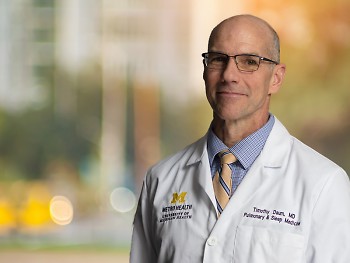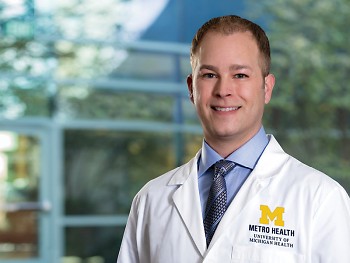If you are one of 22 million Americans who suffer from sleep apnea, you understand how debilitating, frustrating and life-altering the condition can be. Symptoms can include fatigue, sleepiness, lack of focus and poor memory. If you have a spouse affected by sleep apnea you likely understand, too. Your partner may snore loudly, wake up dozens of times throughout the night and feel irritable during the day. But the symptoms go far beyond tiredness: lack of sleep can also lead to serious health issues. Without effective treatment, sleep apnea can lead to high blood pressure, heart failure, atrial fibrillation and stroke.
Despite the proliferation of sleep apnea diagnoses, there have been very few treatment options until now. Two devices recently approved FDA bring hope to sleep apnea sufferers, and Metro Health – University of Michigan Health is leading the charge to implement the Inspire and remedē® systems.
Pulmonologist and Medical Director of Sleep Medicine for Metro Health Timothy Daum, MD, is enthusiastic about the potential for his patients. “These are very exciting therapies, and Metro Health is one of only a handful of health organizations across the country that offer these options.” Daum is part of an interdisciplinary team, working with patients who have obstructive sleep apnea and are candidates for the Inspire device. “Obstructive sleep apnea, or OSA, is the most common type of sleep apnea and causes patients to decrease or stop breathing due to a collapse of the upper airway,” Daum describes. “It’s often caused by obesity, a narrowed airway and chronic nasal congestion.”
The recommended treatment for OSA is usually a CPAP machine. The machine delivers a constant flow of air through tubing to a mask worn while a patient sleeps. For some patients, the device works well and they’re able to breathe at night without interruption. However, many patients can’t tolerate the mask. “Realistically, 40% of people struggle with CPAP,” says Daum. “They hate the machine and wearing a mask while they sleep is bothersome. Until the Inspire system, we didn’t have another option to offer them.”
Inspire is an implanted device that opens the patient’s airway using a gentle pulse. “The Inspire device is implanted in the chest and a stimulator is placed at the base of the tongue, all during a minimally invasive, outpatient procedure,” says Daum. “The device is able to sense when a person is breathing and sends a pulse to lift the tongue and open the airway.”
Inspire is actually turned on and off with a remote, so it only works when the patient needs it. “I’m thrilled to have this option,” Daum exclaims. “We finally have a safe option for patients. We don’t have to tell patients they have no alternatives to CPAP.”
The second device, meant for those suffering from central sleep apnea, or CSA, is called the remedē® System. Like Inspire, the device is implanted during a minimally invasive outpatient procedure, however, remedē® works by stimulating the diaphragm through a nerve in the chest.
“In patients with CSA, the brain isn’t sending signals to the diaphragm to breathe,” explains Metro Health cardiologist Matthew Sevensma. “This type of sleep apnea is most often seen in patients with heart disorders. We implant the remedē® System in the chest and a wire stimulates the phrenic nerve to send a signal to the diaphragm to take a breath.” While the device cannot be turned on and off using a remote, internal sensors monitor time of day, the patient’s breathing and what position they’re in and know when to activate.
A patient at Metro Health was the first remedē® device recipient in the state, and the hospital system also serves as a research site as device makers analyze surgical success, clinical response and device durability. “Any time you can participate in a research study of this magnitude is exciting,” says Sevensma. “It’s unique for a hospital our size to participate in trials like this, but patient recruitment for all of our trials is excellent and that makes us a desirable location.”
CPAP, adaptive servo ventilation (ASV) and bi-level positive airway pressure (BiPAP) are the first line therapies for CSA, but are not tolerated by all patients, and some physicians report that patients’ heart conditions worsen after using BiPAP. “It’s a vicious cycle. Heart failure can cause CSA and CSA can worsen your heart failure,” Sevensma explains.
Sevensma became aware of the remedē® System years ago, but it wasn’t FDA approved until 2017. Since then, he’s been working to bring it to Metro Health and its patients in West Michigan. “Metro Health leadership is very progressive and relentless in their pursuit of new technology. Our Chief Medical Officer, Ronald Grifka, MD, has taken the reins to drive this effort, and many of our service lines are pioneering new treatments and procedures.”
“The adoption of both the Inspire and remedē® systems is not only an example of Metro Health’s commitment to providing patients access to the latest advances in care, it highlights our team approach,” says Metro Health CEO Peter Hahn, MD. “These are multidisciplinary cases that involve pulmonologists, cardiologists, technicians, otolaryngologists and primary care physicians, as well as physicians at Michigan Medicine.”
Daum and Sevenma are hopeful their Inspire and remedē® patients will achieve exceptional outcomes and finally get the sleep they need. “My patients have struggled for so long. I hope they experience renewed energy and can get back to living life again,” Daum concludes.
The Rapidian, a program of the 501(c)3 nonprofit Community Media Center, relies on the community’s support to help cover the cost of training reporters and publishing content.
We need your help.
If each of our readers and content creators who values this community platform help support its creation and maintenance, The Rapidian can continue to educate and facilitate a conversation around issues for years to come.
Please support The Rapidian and make a contribution today.


